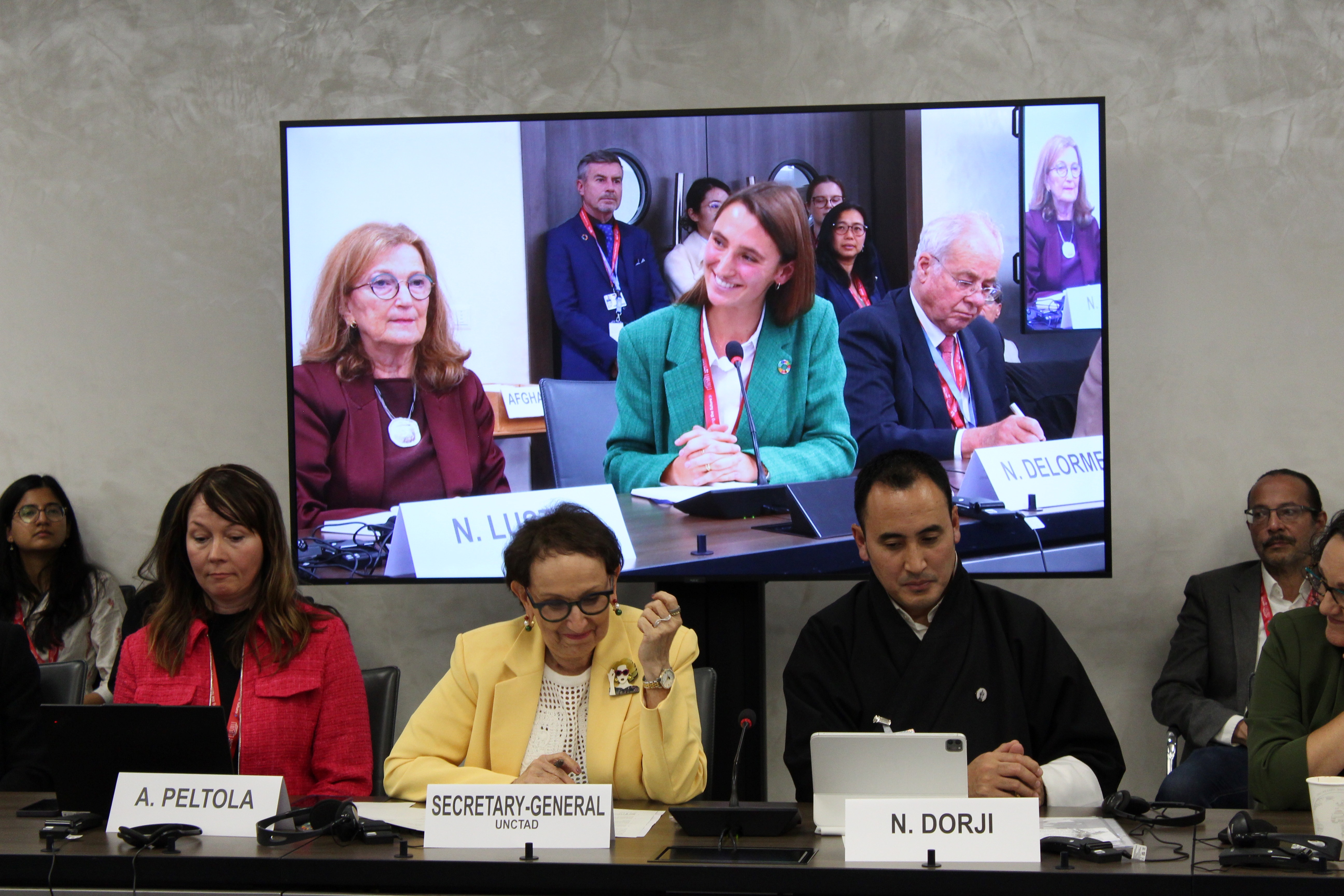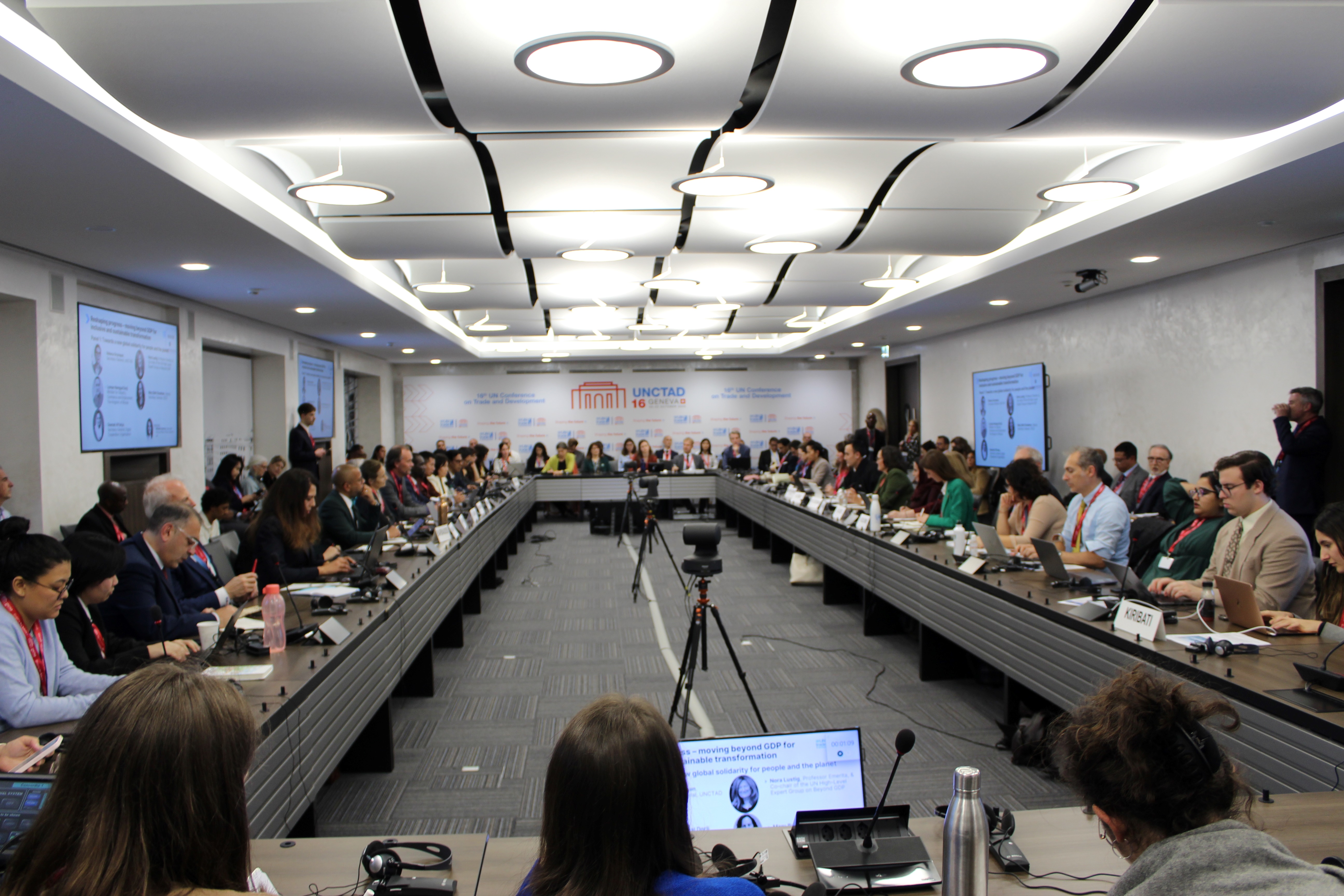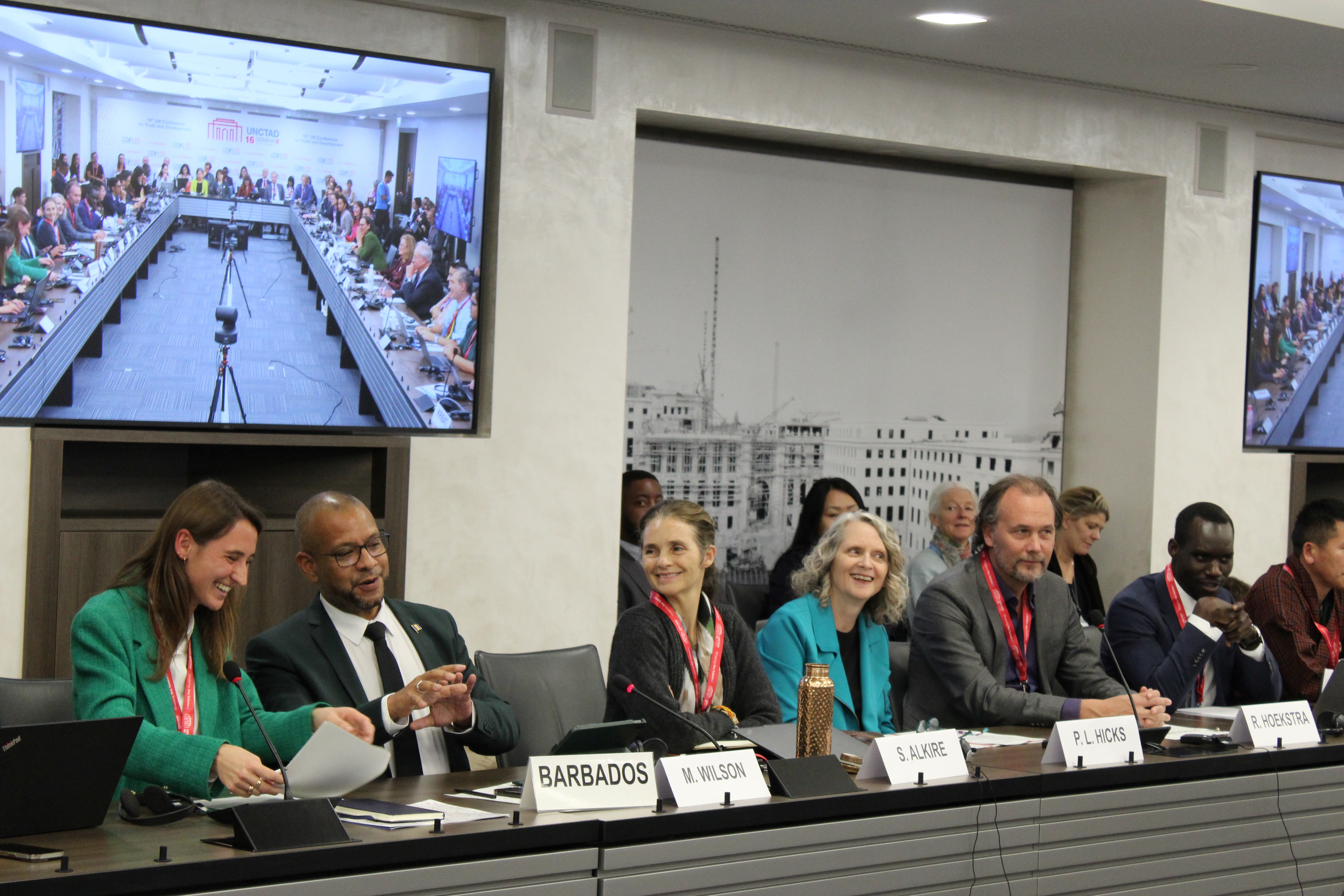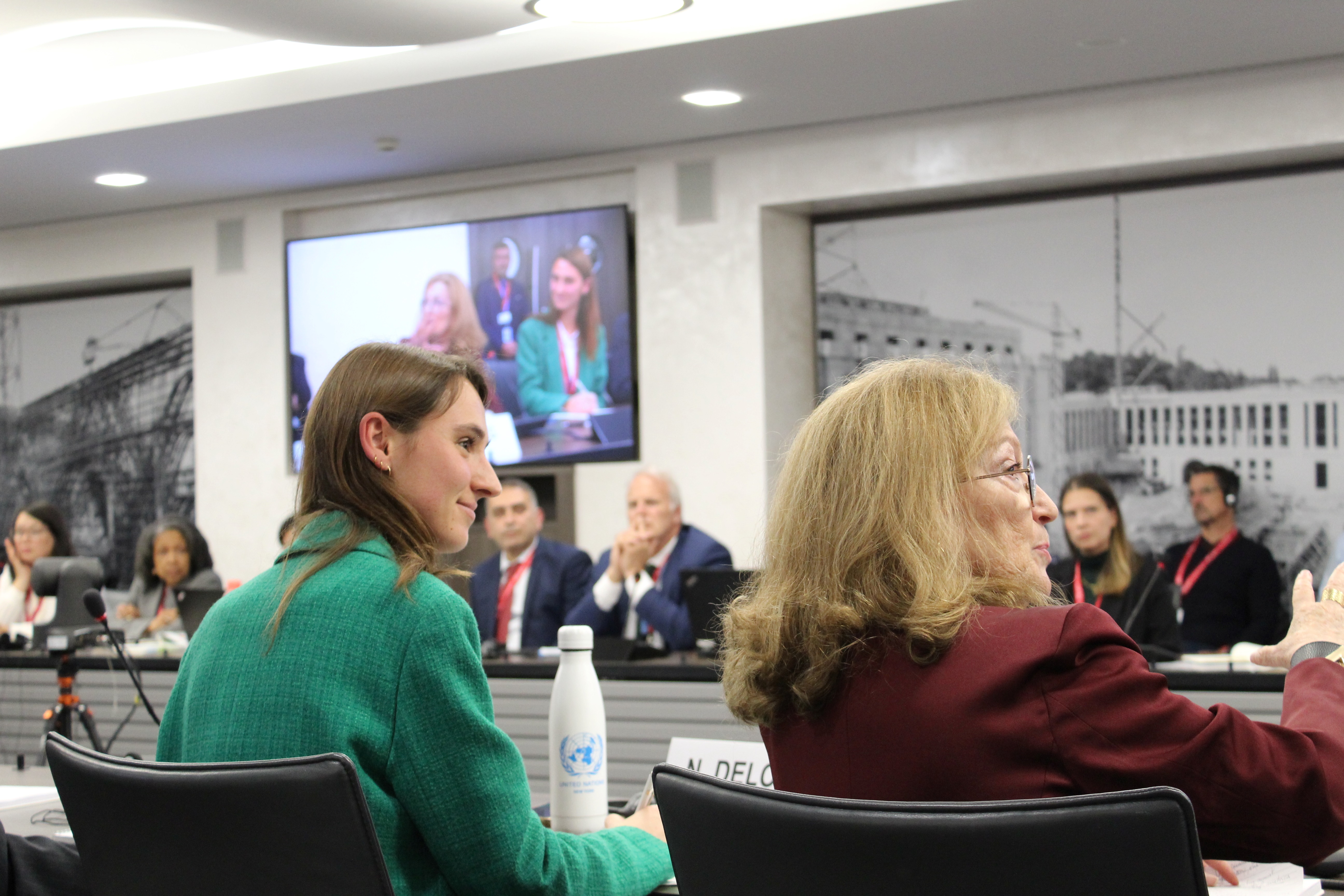24
October 2025
24
October 2025
Event Summary | UNCTAD16 Parallel Event: "Reshaping Progress: Moving Beyond GDP for Inclusive and Sustainable Transformation"

Event Summary of the UNCTAD16 Parallel Event on Beyond GDP
At the 16th Session of the United Nations Conference on Trade and Development (UNCTAD16), UN Trade and Development (UNCTAD) and the Beyond Lab convened a powerful Parallel Event titled “Reshaping Progress: Moving Beyond GDP for Inclusive and Sustainable Transformation.” The event brought together global leaders, youth voices, and experts to explore how development metrics can better reflect what truly matters for people and planet and for current and future generations.
Moderated by Nathalie Delorme from the Beyond Lab, the event featured two dynamic panels and closing reflections from Professor Emerita Nora Lustig, co-chair of the UN Secretary-General’s High-Level Expert Group on Beyond GDP (High-Level Expert Group). The discussions centered on the urgent need to move beyond GDP as the dominant measure of progress, and instead embrace multidimensional indicators that reflect well-being, equity, sustainability, and resilience.

This panel explored how solidarity across borders and generations can guide a new development paradigm.
H.E. Minister Lyonpo Namgyal Dorji (Minister for Industry, Commerce and Employment, The Kingdom of Bhutan) shared Bhutan’s pioneering Gross National Happiness (GNH) framework, which has been embedded in the legal fabric. It requires decision-makers to screen all policies for their impact on the community, governance, and environment. “Resilience is balance,” he said, and the GNH approach helps strike the balance between prosperity and purpose, between material and spiritual advancement. However, there are also some minimum requirements, whereby people and the planet shouldn’t be compromised. He also urged global finance to follow new metrics and respect cultural definitions of progress.
Mary Beth Goodman (Deputy Secretary General, OECD) showcased the extensive work OECD has done to encourage beyond GDP metrics through its Well-being Framework. She noted that two-thirds of OECD member countries have adopted Beyond GDP initiatives, aligning wellbeing metrics with local priorities. The main aim is to inform people-centric and integrated policies across the many dimensions that matter for people, the planet and future generations. She emphasized the role of the private sector, as business and investors have realized that social and environmental sustainability is good for business. She cited the Council for Inclusive Capitalism as an initiative for firms to measure social and environmental impact.
Professor Emerita Nora Lustig (Co-Chair, High-Level Expert Group) presented the High-Level Expert Group and its origins and emphasized that the goal is not to discard GDP, but to complement it with indicators of equal prestige. She explained the shortcomings of GDP which doesn’t measure wellbeing, equity, inclusiveness and sustainability. She underscored the principles driving the process “Making the invisible visible; Giving voice to the voiceless; Making the implicit explicit”. She highlighted that there is an existing consensus to value what counts; however, the difficult task now is to select a limited number of indicators to balance comprehensiveness and parsimony: a dashboard with a maximum of 20 indicators to measure what counts.
H.E. Deemah AlYahya (Secretary-General, Digital Cooperation Organization) stressed the need to include digital economy indicators, especially digital inclusion and youth participation, to prevent deepening inequality. She highlighted the importance of considering cumulative exclusions, “the divide within the divide”.
Rebeca Grynspan (Secretary-General, UNCTAD) proposed a compelling metaphor: GDP is a photograph, but we need a movie. She called for richer indicators like the Multidimensional Poverty Index to better inform policymaking and budgeting. She also emphasized the central role of data and the persistent gap in national statistical system capacity, particularly in developing countries. She called for strengthening national statistical capacity so that countries can own and shape their metrics beyond GDP rather than rely solely on external resources.

This panel focused on how Beyond GDP metrics can drive real change in policy and practice.

H.E. Ambassador Matthew Wilson (Ambassador of Barbados to the United Nations, WTO and other International Organization in Geneva) stressed the need for resilience in both climate and debt. High debt burden diverts resources from essential expenditures, making investing in well-being, climate resilience and economic diversification difficult. He spoke passionately about the Bridgetown Initiative, an example that successfully changed the status quo, by spearheading the adoption of “Natural Disaster Clauses” to suspend repayment of loans in the event of a disaster. Equally, the beyond GDP initiative should challenge the status quo; GDP-based metrics can exclude vulnerable countries from concessional finance and policy support. Beyond GDP should be adapted to national circumstances while also being internationally comparable. He warned against echo chambers and that we must engage with sceptics. Finally, he called for deeper youth engagement, invoking the Iroquois 7th Generation principle: “Decisions today must serve the next seven generations.”
Sabina Alkire (Director, Oxford Poverty and Human Development Initiative, University of Oxford) offered four guiding principles for indicators: they must be actionable, providing clear guidance for decision-making; go beyond averages by including highlighting inequalities falling below the minimum requirements; be non-paternalistic, incorporating a bottom-up approach where countries define their vision of progress; and focus on the most vulnerable incorporating cumulative deprivation. She also emphasized to the High-Level Expert Group to be clear if they aim to use existing data or change the data environment to collect new data.
Peggy Hicks (Director, Thematic Engagement Division, Office of the UN High Commissioner for Human Rights, OHCHR) argued that rethinking GDP goes beyond adjusting a metric and fundamentally rethinking the economy itself. She called for inclusive consultations, especially with civil society and Indigenous peoples, to avoid repeating the old exclusions. She recommended advancing a human-rights economy integrating the right to development.
Rutger Hoekstra (Associate Professor, Institute of Environmental Sciences, Leiden University) traced GDP’s origins after the Second World War, building on the systems of national accounts. GDP's hegemony created a dominant narrative. He emphasized the importance of building a shared narrative around Beyond GDP, using inclusive and culturally relevant language to ensure broad engagement and ownership.
Max Amanu (Youth Network on Beyond GDP representative) brought a powerful youth perspective, stressing that youth involvement must go beyond tokenism. He used his experience growing up in Uganda to call for metrics that reflect realities and aspirations, and for inclusive processes that reach those outside elite spaces.

This event marked a critical moment in the global movement to reshape progress. It made clear that Beyond GDP is not just a technical exercise, but a political and ethical imperative. Youth and intergenerational justice must be at the center of this transformation. As the High-Level Expert Group continues its work, the voices heard at UNCTAD 16 will help shape a future where we measure what truly matters. The Youth Moving Beyond GDP initiative will continue to institutionalize intergenerational equity as one of its core principles.
Learn more about the High-Level Expert Group on Beyond GDP: Expert Group on Beyond GDP | United Nations
Learn more about the Youth Moving Beyond GDP initiative: Youth Moving Beyond GDP